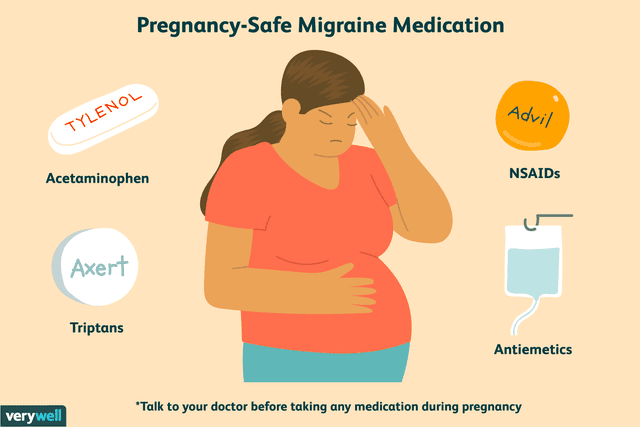Headache Medications Safe During Pregnancy

JGI / Jamie Grill / Getty Images
Medically reviewed by Huma Sheikh, MD
There are several headache medications that the Food and Drug Administration (FDA) considers safe to take while pregnant. There are also some headache medications that should be avoided during pregnancy because of potential harm to you or the developing fetus.
Headaches can be a common symptom of pregnancy, with about half of those surveyed in one study saying they experienced one during pregnancy.
This article will go over headache medications that are considered safe during pregnancy. You'll also learn which medications to avoid during pregnancy, as well as some alternatives to using medications to treat headaches.

Verywell / JR Bree
You should always talk to your provider or midwife before taking any prescription or over-the-counter (OTC) medication while you're pregnant.
Related:Are Sleep Medications Safe While You're Pregnant?
Why Are Some Medications Unsafe During Pregnancy?
Research has shown that taking some medications while pregnant may harm you or your fetus. Most medications will cross the placenta and enter the fetus's bloodstream, and some of them carry a risk of causing birth defects, developmental disabilities, or miscarriage.
It's important to note that while researchers do have some understanding of how certain medications impact pregnant people and developing babies, they don't know how the vast majority of medications impact pregnancy. That's because it's unethical to test the safety of medications on pregnant people.
When medical providers are unsure whether a medication is safe to take during pregnancy, they may weigh the benefits against the potential risks when advising you whether to take it.
Increased hormones and a change in the volume of blood in your body can contribute to headaches during pregnancy.
What Are Safe OTC Pain Medications During Pregnancy?
Pain medicine (analgesics) are drugs that can relieve headaches. The analgesics that are most commonly used for head pain are acetaminophen and nonsteroidal anti-inflammatory drugs (NSAIDs).
Both types of drugs are available over the counter (OTC) as brand name, store-brand, and generic products.
Related:What to Do If You Get a Cold While You're Pregnant
Acetaminophen
Acetaminophen is usually considered the safest pain relief medication for most pregnant people. It blocks nerve impulses to the part of the brain where pain signals are made. There are dozens of brand names for acetaminophen, but the most well-known is Tylenol.
Some research has suggested that taking acetaminophen while you're pregnant could be linked to health concerns for children later on—for example, asthma, learning challenges, and attention deficit/hyperactivity disorder (ADHD).
In a consensus statement published in 2021, a group of scientists and healthcare professionals recommended caution when using acetaminophen during pregnancy.
The group advised healthcare providers to tell patients not to take acetaminophen unless "medically indicated" by a physician or pharmacist, and to use the lowest effective dose for the shortest possible time when it is indicated. They based this advice on the body of research in humans and animals that they believe suggests the use of acetaminophen during pregnancy could alter fetal development.
In response to the consensus statement, the American College of Obstetricians and Gynecologists (ACOG) said there is no clear evidence of a direct cause-and-effect relationship between acetaminophen and fetal harm. To date, ACOG has not changed any of its guidelines on the use of acetaminophen during pregnancy. Still, you should always consult your healthcare provider before taking any medication during pregnancy, including acetaminophen.
Instead of not taking acetaminophen for migraine pain while you're pregnant, your provider may tell you to use the lowest dose possible for the shortest amount of time.
Avoiding Overdose
If it's not used properly, acetaminophen can cause liver damage in some people—whether they are pregnant or not.
Liver damage is most likely to happen when someone takes too much acetaminophen. This can easily happen accidentally if someone takes the drug at the same time as a combination product that also has acetaminophen in it.
No one should take more than 4,000 milligrams (mg) of acetaminophen in one day.
You can prevent an overdose by carefully reading labels on any drug you take and always checking with your provider before starting new medications, even if they're over-the-counter.
Read Next:Experts Say Pregnant People Should Avoid Tylenol
NSAIDs (only before 20 weeks)
NSAIDs are the second-line treatment for headaches during pregnancy. These drugs decrease the production of hormone-like compounds called prostaglandins that send pain messages to the brain.
Examples of NSAIDs include:
Aspirin (the most common brand is Bayer)
According to the Organization of Teratology Information Specialists (OTIS), NSAIDs are safe for most pregnant people when used before the end of week 20.
After that, there's a risk that ibuprofen use might lead to kidney problems in the fetus that can cause low levels of amniotic fluid.
During the last three months of pregnancy, there is a risk that ibuprofen could cause a blood vessel called the ductus arteriosus to close prematurely. If this happens, it can affect blood pressure in the developing fetus's lungs.
There is some evidence to suggest that the use of NSAIDs early in pregnancy (up to eight weeks) could cause bleeding and potential miscarriage. However, it is important to note that miscarriage can happen in any pregnancy, and often the reason is not known.
If you're pregnant and know that ibuprofen works best for your headaches, talk to your provider about how to safely use it during your first and second trimesters.
You should also know about the possible health problems associated with NSAIDs that can happen to anyone, such as an increased risk of heart attack or stroke. These risks are especially important for people who take these medications for a long time.
NSAIDs have also been found to cause ulcers and bleeding in the stomach or intestines. This risk is especially high for people who take NSAIDs for a long time or who drink a lot of alcohol.
Related:How to Take Ibuprofen for Migraines and Headaches
Safe Prescription Headache Medicine During Pregnancy
There are several prescription medications you can take if you experience more severe headaches, including migraines, while pregnant.
Triptans
Triptans are a class of prescription drugs that are the most effective for moderate to severe migraines. They work best when taken at the earliest sign of an impending migraine attack.
Triptans stimulate the production of a brain chemical called serotonin which reduces inflammation and constriction of blood vessels.
Triptans also may lower levels of a protein called calcitonin gene-related peptide (CGRP) that is high during migraine attacks. The drugs can also be an effective way to relieve nausea and sensitivity to light and sound.
The seven triptans used to treat migraines are:
Axert (almotriptan), available as a tablet
Relpax (eletriptan), available as a tablet
Frova (frovatriptan), available as a tablet
Amerge (naratriptan), available as a tablet
Maxlt, Maxlt-MLT (rizatriptan), available as a tablet or as a wafer that melts on the tongue
Imitrex (sumatriptan), available as a tablet, nasal spray, or under-the-skin (subcutaneous) injection
Zomig (zolmitriptan), available as a tablet, nasal spray, or wafer
Treximet (sumatriptan combined with the NSAID naproxen), available as a tablet
There is some concern that because triptans work by narrowing brain blood vessels, there could be a narrowing of the blood vessels that supply the placenta.
However, research has found triptans to be safe during pregnancy. They have not been linked to a major increase in birth defects, prematurity, or miscarriage.
Learn More:Using Triptans for Migraine Relief
Antiemetics
Along with headaches, migraines often cause nausea and vomiting—symptoms that some pregnant people already have. In this case, migraines can make those symptoms worse.
Since there are serious health risks of not being able to keep down fluids, food, and medication, drugs called antiemetics are often given to people who seek emergency care for migraines.
These medications do not have to be taken by mouth; in fact, they are usually given in a vein (intravenously) or by injection into a muscle.
Metoclopramide is considered the safest antiemetic for pregnant people, but it's not totally without risk. First-trimester exposure to metoclopramide has been associated with an increased risk of genital organ defects.
More research is needed to determine whether other antiemetics are safe to use during pregnancy.
Related:Can I Take Allergy Medication If I'm Pregnant?
Medications to Avoid During Pregnancy
Certain drugs prescribed for headaches have been associated with an increased risk of serious side effects for pregnant people and developing fetuses, including:
Dihydroergotamine, which is available as D.H.E. 45 or Migranal (an ergot alkaloid)
Depakote (anticonvulsant valproic acid)
Some OTC and prescription headache medications contain caffeine. While The American College of Obstetricians Gynecologists says that less than 200 mg per day of caffeine doesn't appear to be a major contributing factor in miscarriage or preterm birth, it's unclear whether consuming more than that could have an effect.
In addition, there's some evidence that consuming even small amounts of caffeine may effect birth weight.
Be sure to check a medication's label to see how much caffeine it contains. Some medications that contain caffeine include fioricet, midol, and excedrin.
Related:How to Deal With Morning Sickness
Medication Alternatives to Treat Headaches During Pregnancy
Thanks to stable levels of estrogen, some pregnant people who tend to get bad headaches might actually be relieved of them for a while. In that way, pregnancy can sometimes be a temporary treatment for headaches.
According to the American Migraine Foundation, as many as 50% to 80% of pregnant people actually experience fewer headaches.
If you're one of the people who still get headaches during pregnancy, finding a safe way to treat them is important.
If you want to avoid taking medications for a headache while you're pregnant, there are some other strategies you can try:
Avoiding headache triggers: Try to steer clear of things that bring on your headaches, such as certain foods or activities
Exercising: Exercise may have a positive effect on headaches, including migraines, possibly by making you feel calmer and regulating sleep
Managing stress: Engaging in cognitive behavioral therapy (CBT), or meditation or other relaxing activities can help induce calm, reducing tension that may be triggering a headache
Learn More:Natural Ways to Treat Headaches During Pregnancy
Always Speak With a Healthcare Provider
If you had occasional headaches prior to pregnancy, you won't be surprised to get them while pregnant. But if your headaches are severe or feel different, it's best to be cautious and contact a healthcare provider.
Seek immediate medical care if you get a severe, persistent headache and symptoms such as:
Fever
Blurry vision
Changes in your field of vision
These could be signs of a more serious condition like a stroke, preeclampsia, a pituitary tumor, or a blood clot in the brain.
Summary
Most headaches during pregnancy are uncomfortable but not an emergency. Thanks to stable hormone levels, you may even find that you have fewer headaches while you're pregnant.
If not, talk to your provider about the safest medications to use to manage your headache pain and other symptoms at home.
It's not as common as a run-of-the-mill headache or even a migraine, but sometimes a headache during pregnancy can be a sign of a more serious health condition.
If you develop a severe headache that does not get better with treatment or comes with other symptoms like a fever or blurred vision, you need to get medical care right away.
Read Next:Which Asthma Medications Are Safe During Pregnancy?

